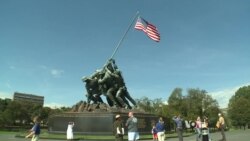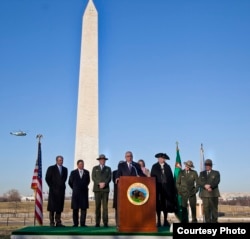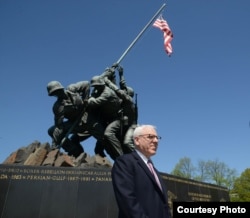David Rubenstein wasn't always a wealthy man.
He grew up with "very, very modest means" in Baltimore, Maryland, about 80 kilometers (50 miles) from Washington, "but maybe 50 light-years away in many respects," Rubenstein observed. “It’s a very family-oriented, blue-collar kind of town, and the types of things you can do in Washington really don't happen in Baltimore."
After practicing law in New York, Rubenstein moved to Washington, where he worked in the White House as deputy domestic policy adviser for President Jimmy Carter before going into business for himself.
Today, he's a billionaire. He made his fortune as co-founder and co-chief executive of The Carlyle Group, a global private equity firm based in Washington.
“I decided to start the first private equity or buyout firm in Washington, D.C.," he said. "Washington isn’t a place where normally these kinds of things begin. But we got lucky. I hired some very good people to join me, and ultimately we turned out to be one of the most successful in the world in this area.”
Rubenstein feels very fortunate to have made it as a businessman, and feels the need to give back to a country he believes provided him with great opportunities.
Historic preservation
So he turned his attention to a particular area that was especially meaningful for him: helping preserve American history by funding restoration projects for some of the country's most historic landmarks.
He calls it patriotic philanthropy, which he defines as "helping your own country in preserving its heritage and reminding people of its history.”
He spends many hours with the U.S. National Park Service to determine which landmarks need his help.
When an earthquake damaged the Washington Monument in 2011, for example, Rubenstein donated $7.5 million to help restore it — half the cost of the repairs.
“It’s an iconic building and one of the buildings I think is the most recognizable symbols of our country," he said. "So when it had earthquake damage, I thought it would be a good idea as a citizen to give some support to helping it get repaired as quickly as possible.”
He is also helping to preserve the U.S. Marine Corps "Iwo Jima" War Memorial in nearby Virginia, with a gift of more than $5 million.
The iconic statue, inspired by a Pulitzer Prize-winning photograph, depicts six U.S. service members raising an American flag on top of Mount Suribachi during the World War II Battle of Iwo Jima more than 70 years ago.
“The Iwo Jima Memorial was really designed to be a memorial for all Marines who died in combat," Rubenstein said, "but of course the symbol is for the Marines who raised the flag at Mount Suribachi during the fight to take Iwo Jima.”
Tribute to father
For Rubenstein, the statue has personal meaning.
"My father was a Marine in World War II," he said, "and as I thought more about a way to honor him — he had passed away about two or three years earlier — I decided that what I would try to do is work with the National Park Service to see if I could find a way to improve it or modernize it and rehabilitate it, because it hadn't been repaired in quite a while.
“So it's really a symbol of my trying to honor my father but also a symbol of what Marines and what all Americans have done to try to honor their country by giving the ultimate last devotion of service to their country,” he added.
Aaron LaRocca, an official with the National Park Service, said the philanthropist's donation came at a very fitting time.
“In 2016, we are entering the centennial year, the 100th anniversary of the National Park Service," he said. "The donation is going to work to preserve the entire statue, from the pulley that operates the flag, all the way down to the base, and the plinth and the platforms.”
Lee Memorial
Rubenstein is also helping to restore Arlington House, the Robert E. Lee Memorial, with a gift of more than $12 million.
The historic home is on a former plantation within the grounds of Arlington National Cemetery across the Potomac River from Washington.
Lee, commander of the Confederate Army of Northern Virginia in the American Civil War, lived there with his family for 30 years.
LaRocca said that among the restoration efforts currently taking place at the house is a project to remove the original, crumbling bricks from the foundation and have them tested so they can be replaced with bricks that closely match them.
Rubenstein hopes that his philanthropic efforts will encourage other Americans to learn more about their country and help support it in any way they can.
“Philanthropy is an ancient Greek word which means 'loving humanity.' It doesn't mean rich people writing checks," he said. “So you can use whatever money you might have, but you can [also] use your time, your energy, your ideas to help your community, state or your country.
“Ultimately the goal is to make people become more informed citizens, because if you have a better informed citizenry, you hopefully will have a better democracy, and a better country.”







